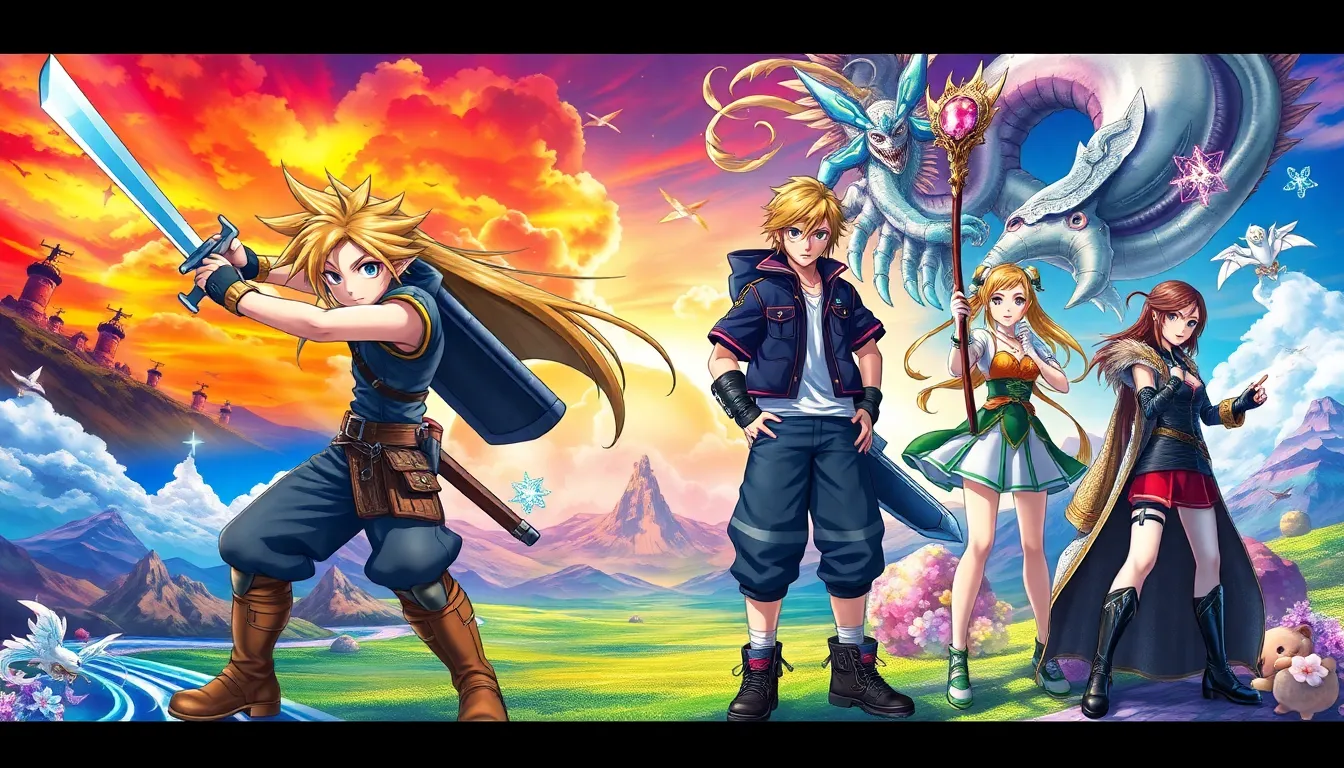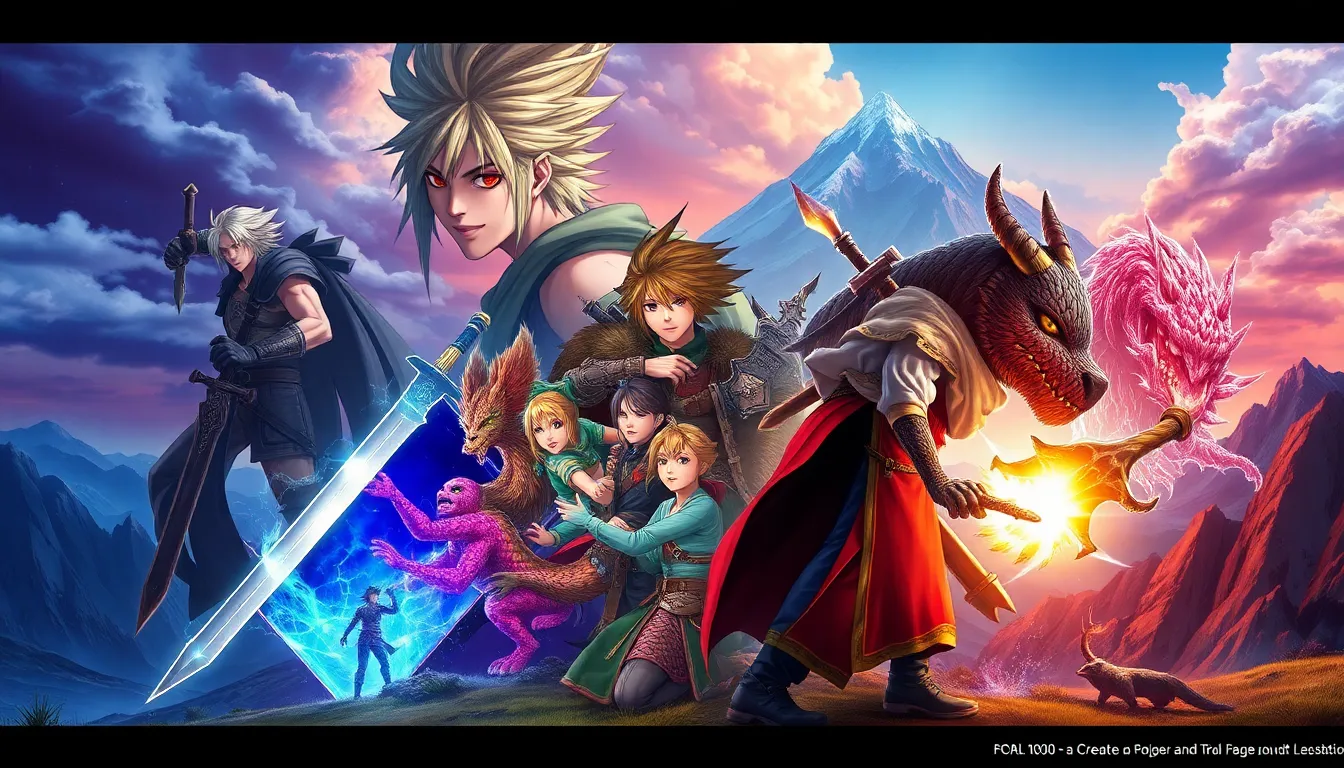Physical Address
304 North Cardinal St.
Dorchester Center, MA 02124

Final Fantasy isn’t just a game series; it’s a cultural phenomenon that has captivated gamers for decades. With its epic storytelling, unforgettable characters, and iconic music, each installment invites players into a fantastical world where chocobos roam free and villains plot their next nefarious move. But with so many titles in the franchise, how does one choose the best of the best?
The Final Fantasy series began in 1987, created by Square, now known as Square Enix. Since its inception, the franchise has introduced 15 mainline titles, numerous spin-offs, and an array of remakes. Each game offers players unique worlds, intricate plots, and diverse combat systems.
Noteworthy titles include Final Fantasy VII, which revolutionized the RPG genre with its compelling story and 3D graphics. Characters like Cloud Strife and Sephiroth became icon figures, transcending gaming culture. Similarly, Final Fantasy X carried emotional depth with its character-driven narrative and voice acting, appealing to a broader audience.
The series excels in innovation, constantly evolving gameplay mechanics. Final Fantasy XIV marked a significant shift by embracing the MMORPG model, gaining a vast player base and critical acclaim. Players enjoy engaging content updates, fostering a connected community.
Musical scores throughout the games enhance the emotional experience. Composers like Nobuo Uematsu crafted unforgettable soundtracks that resonate with fans. Themes from various titles, like “To Zanarkand” from Final Fantasy X, evoke nostalgia and connection, enriching the overall experience.
Art styles also contribute to the franchise’s allure. Vivid graphics and character designs draw players into surreal environments. Evolving technology has allowed Final Fantasy games to push visual boundaries, with stunning landscapes and character models.
Since its launch, the Final Fantasy series maintained a loyal following, thanks to its storytelling, diverse gameplay, and beloved characters. With each release, excitement builds, and anticipation remains high as fans await the next chapter in this iconic franchise.

Determining the ranking of Final Fantasy games involves evaluating various critical aspects that contribute to their impact and appeal. Each entry in this iconic series deserves careful consideration based on its unique narrative, gameplay mechanics, graphics, and sound design.
Narrative and storytelling play crucial roles in the Final Fantasy series. Engaging plots shape player experiences, with themes of love, loss, and heroism prevalent throughout. Characters often undergo significant development, immersing players in their journeys. Final Fantasy VII showcases a complex story filled with memorable characters and emotional moments. Besides, games like Final Fantasy X emphasize character relationships and emotional depth. Innovative storytelling techniques, such as nonlinear narratives and intertwining plotlines, enrich the gameplay experience, ensuring players remain captivated.
Gameplay mechanics significantly influence a game’s ranking. Each Final Fantasy title employs unique combat systems and mechanics that shape player interactions. Turn-based systems are typical in earlier titles, while later entries explore real-time combat, adding dynamism to gameplay. Final Fantasy XII introduces an Active Dimension Battle system that enhances strategy and immersion. Character customization options, such as job systems and skill trees, allow for tailored gameplay experiences. Challenging boss fights and side quests contribute to overall satisfaction, making gameplay an essential factor in ranking.
Visuals and sound design critically impact the gaming experience. Each installment showcases distinct art styles, from pixelated graphics in early games to stunning 3D environments in more recent titles. Final Fantasy XV exemplifies state-of-the-art graphics with breathtaking landscapes and character designs. Soundtracks, composed by talents like Nobuo Uematsu, elevate emotional narratives, creating unforgettable moments. Iconic themes, such as “One-Winged Angel,” remain etched in players’ memories. Overall, high-quality graphics and immersive sound design enhance the overall enjoyment and contribute to the franchise’s legacy.
This section ranks the mainline entries and spin-off titles within the Final Fantasy series based on narrative, gameplay mechanics, graphics, and sound design.
Celebrated for its groundbreaking storytelling and memorable characters, this title reshaped RPGs.
Known for its emotional narrative and voice acting, it introduced 3D graphics and captivating cutscenes.
Praised for its rich character development and a compelling plot, it remains a fan favorite.
Featured a charming aesthetic and a nostalgic return to classic RPG roots, adding depth to its storytelling.
Transformed into a thriving MMORPG, it boasts continuous content updates and an engaged global community.
This prequel enhanced the narrative of FFVII, adding depth to Zack Fair’s story.
Focusing on strategic gameplay, it introduced a complex battle system and a compelling political narrative.
Offered a simplified version of the original’s story, catering to mobile gamers with accessible gameplay.
Combined iconic characters in epic battles, appealing to fans through its unique combat system.
Noted for its cooperative multiplayer gameplay, this title emphasized teamwork and exploration.
Final Fantasy significantly shaped gaming culture, influencing countless developers and inspiring numerous titles. The franchise’s innovation set benchmarks in storytelling and gameplay mechanics. Emotional narratives resonated with players, creating lasting bonds between characters and gamers.
Iconic musical scores, particularly those by Nobuo Uematsu, became critical to the experience, enhancing immersion. Themes from the series frequently evoke nostalgia, compelling players to revisit their adventures. The artwork also captured attention; unique designs and evolving visuals contributed to a distinct identity.
Engagement within gaming communities flourished due to Final Fantasy. For instance, fan events, conventions, and forums serve as platforms for discussions and expressed passion. The series helped define the RPG genre, leading to broader acceptance and popularity.
Cultural references emerged from Final Fantasy, permeating mainstream media. Catchphrases and memorable characters became recognizable beyond the gaming niche. Merchandising, adaptations, and collaborations expanded its reach, showcasing the franchise’s enduring influence.
Final Fantasy XIV exemplifies continuous cultural impact, successfully popularizing the MMORPG model. The game fostered a vibrant online community that celebrates achievements and shares experiences. This live-service model reshaped expectations for future online games.
The franchise continues to evolve, pushing boundaries in technology and gameplay standards. New releases always generate excitement, demonstrating the lasting legacy of Final Fantasy. Developers often look to its innovations as a blueprint for future games.
The Final Fantasy series stands as a monumental achievement in gaming history. With its captivating narratives and innovative gameplay it has carved a unique niche in the hearts of players worldwide. Each installment brings something fresh while honoring the legacy of its predecessors.
As gamers eagerly anticipate future releases the franchise’s ability to evolve ensures its continued relevance. The emotional connections forged through its characters and stories will keep fans engaged for years to come. Whether through epic battles or heartfelt moments the magic of Final Fantasy will undoubtedly persist in shaping the gaming landscape.